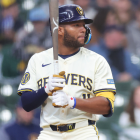Over the weekend, news broke that the Yankees had agreed to sign lefty reliever Zach Britton to a three-year, $39 million deal. Chances are seemingly just as well that it could be a two-year, $26 million or a four-year, $53 million deal, though.
Say what?
Yes, this is an innovation in baseball contracts that appears to have started last offseason with Jake Arrieta's Phillies deal. Arrieta's deal on the surface was widely reported as a three-year, $75 million contract, but he can opt out after 2019 OR the Phillies can void that opt out by adding two years and $45 million for the 2021 and 2022 seasons. Or both sides could do nothing and let the three years play out.
As such, Arrieta's deal could end up being:
- Two years and $55 million.
- Three years and $75 million.
- Five years and $120 million.
This structure is going to become more and more important these next few years until there's a new collective bargaining agreement. With player salaries decreasing as a percentage of revenue while the luxury tax is used by owners as a salary cap, agents will need to continue to be creative in finding ways for their clients to get what used to come much more easily.
That is to say, before last offseason's free agency period collapsing on top of itself, Arrieta probably would have just gotten five years and $120 million. Instead, he had to wait around until March and some creativity was needed.
Baseball's most famous and polarizing agent, Scott Boras, happens to be the agent for both Britton and Arrieta. Japanese import Yusei Kikuchi is also a Boras client and his Mariners deal has a similar structure.
He has also attempted to name this innovation:
Do tell, Scott! “It’s a ‘swellopt.’” A what? “For the club, if the player performs well, the club can opt in (contract swells). For the player, if the club doesn’t opt in, the player has the choice to continue with contract (swell) or opt out. It’s a swell option for both.”
— Ken Rosenthal (@Ken_Rosenthal) January 6, 2019
Yeah, I'm gonna pass on that one, Scott.
Regardless, this sort of deal will start to become more commonplace. It makes sense. The team isn't 100 percent locked into the big-future dollars while the players have a chance to either force their hand with huge seasons early in the deal or opt out if the market finally corrects itself and starts paying players what they're worth compared to how much money in which teams are swimming right now.
The mind immediately goes to Manny Machado and Bryce Harper here, naturally. The two biggest free agents in recent memory haven't had quite the market many expected and using a method with several opt outs and team options could be a way for a team to creatively work around future luxury tax concerns while also giving the player a path to a $300M-plus deal.
Harper is a Boras client and surely Machado's agency -- MVP Sports Group -- is paying attention and will look into a similar path.






















